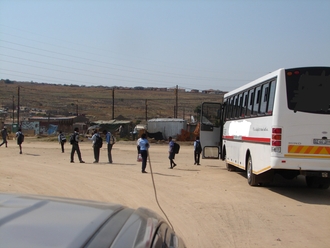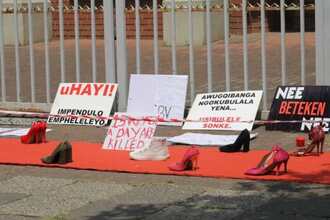- Featured
- Clean air
- Climate justice
- Consumer Rights
- Corporate Accountability
- Data access
- Early Childhood Development
- Economic fairness
- Education
- Electoral fairness
- Environmental justice
- Food justice
- Gender based violence
- Grants/social assistance
- Health
- Housing and infrastructure
- Industry interference
- Land Justice
- LGBTQIA+ rights
- Media/ information access
- Public transport
- Racism
- Reparations
- Safety
- Sanitation
- Service Delivery
- Sexual and Reproductive Rights
- Social justice
- Unemployment
- Womxn's rights/ gender equality
- Workers' rights
- More
-
Mpho Mashamba, Tell us why we are not getting the 5% Increase on our StipendsWe feel like we are being taken advantage of, and it’s disheartening because we know how desperately we need these internship positions. It’s painful to see people in the department disregard our agreements, believing we won’t speak up out of fear of losing what we desperately need. We urgently need the department to clarify the expectations mentioned above. We are exhausted from being treated this way. It’s time for us to come together and demand the clarity we deserve, to stand up for ourselves and ensure our voices are heard.86 of 100 Signatures
-
2026 Budget Speech: Demand a BIG Now!Millions in Mzansi cannot afford to put food on the table. The Basic Income Grant will allow people to afford basic needs and lead decent livelihoods. Research by economists and experts has shown that not only is the BIG affordable, but it can also generate far greater economic growth.248 of 300 Signatures
-
PRASA bring back the 5:10am train from Cape Town to NyangaOvercrowding on trains is just a recipe for disaster. People could end up losing their lives if this issue is not addressed as quickly as possible. Vulnerable people like school children and the elderly also use those trains, and their lives are being endangered on a daily basis. The absence of the train we had is causing a catastrophe, and this is why it has to be brought back. Overcrowded trains mean some people never even make it on, which results in them being late for work, getting in trouble with their bosses, and consequently losing their jobs. School children are also facing difficulties because of this. Many of them now have to rely on taxis to reach the southern line trains, which means they have to spend more money. They also get home late, around 5:30 pm to 6 pm, even though school ends earlier, which affects their ability to complete their homework. We must take action now, before the human cost becomes far too high.152 of 200 SignaturesCreated by Hlubikazi Hlubikazi
-
We demand that Gauteng Department of Education bring back school transport NOW!• A lot of children from disadvantaged backgrounds are affected since they are the ones who mostly use buses, as they cannot afford to pay for private transportation. • There are children who can't walk to school because they live near farms with no school close by, and very few taxis • Some of these children are still very young to travel to school on their own, so they need reliable transport. • Their safety is not prioritised, as they are also exposed to human trafficking, as they have to hike to school. References 1. Concerned parents urge GDE to resolve scholar transport problems by SABC, 03 February 2026. https://www.sabcnews.com/sabcnews/concerned-parents-urge-gde-to-resolve-scholar-transport-problems/660 of 800 SignaturesCreated by Mamello Segale
-
REGULATE AIRBNB, PROTECT COMMUNITIES, HERITAGE AND GOOD LANDLORDSThere is a housing crisis in Cape Town. This crisis is rooted in an unjust past. Spatial Apartheid still needs to be redressed, the working-classes still have no access to the city. However, this crisis is only deepening today - new technologies like AirBnB have extended the logic of financialization to the housing sector, where homes are viewed solely as financial assets - disconnected from the communities, families and culture which relies upon it. Unchecked by state regulation, the logic of financialization raises property and rental prices to insane levels, encourages the development of micro-apartments and pushes out working-class owners, & middle-class renters further out of the city. This has the run-on effect of creating more displacement down the line, erasing the heritage, culture and livelihoods of the black and coloured working class, with the Bo-Kaap being a prime example of this.2,069 of 3,000 SignaturesCreated by Rent Control SA

-
SAVE THE SEARLE STREET FAMILIES. STOP THE DISTRICT SIX EVICTIONS NOW!APARTHEID DID NOT END. IT WAS REBRANDED. Today forced removals are no longer justified solely by race, but by PROFIT and exclusion under the banner of ‘development’. The result is the same. Working and middle class families are being pushed out of our cities while the wealthy are prioritised. Our cities are being stripped of its people and their histories. The Searle Street Cottages and the residing families are among the very few who survived the forced removals of the late 1960s, when over 60 000 people were displaced from District Six. Now, in 2026, 60 years after District Six was declared a “White Group Area” they face eviction and displacement AGAIN. HOW CAN ONE SURVIVE APARTHEID FORCED REMOVALS ONLY TO BE EVICTED IN DEMOCRACY? The six semi-detached cottages were originally owned by the Holy Cross Sisters, who fought their demolition during the Apartheid Regime. Despite this history, the properties were later sold (circa 2014) to a Mpumalanga-based developer for R2.4 million, even when the long standing residents had attempted to purchase their homes themselves. Instead of being given the opportunity, families were forced to discover their homes for sale online. WHY were they not given the chance to buy the properties at a FAIR PRICE? Click here to view a write up and here for the timeline of events. Today, the same developer has issued notices requiring residents to vacate the cottages by the end of February 2026. Many of these families have lived there their entire lives, with one family residing there since the early 1920s, housing five generations. These are not vacant buildings. These are FAMILY HOMES and communities that are threatened by a system that prioritises profit over people. While the plans for the property are not clear there is well warranted speculation around the developer’s intended plans to demolish the family homes and develop "micro-lofts with mountain views" who the average South African would not be able to afford. Why are profit driven agendas being prioritised over the right to affordable housing in the inner city? Why were residents denied the opportunity to buy their homes at a fair price? Why is the painful history of District Six being repeated under the banner of “development”? This is not just a housing issue. It is a moral failure, a historical injustice and a continuation of displacement in a country that has yet to redress the injustices of the past in a city already facing an urgent housing crisis. WE DEMAND ACTION NOW: 1. Stop the eviction of the District Six Searle Street Families NOW! 2. Allow the families to purchase their homes at a fair price Reject the erasure of District Six history. Stop the ongoing cycle of forced removals. District Six is not for sale. People above profit. Upcoming Events in Solidarity that you can get involved in: * 4 February 2026 at 17:30 @D6 Museum– Rent Control Group Workshop on the Rental Housing Crisis in Cape Town. * 7 February 2026 at 14:00 @ Cissie Gool House Hall– SaveSearleStreet Campaign supported by the Umbrella Civic ward 57+, Rent Control Group, Walmer Estate Civic Association and Reclaim the City will host a Learning, Banner and Poster making session ahead of the Mid-February Solidarity Picnic Event (SAVE SEARLE STREET RESIDENTS). Please keep an eye out on our social media for further updates. Come and learn about what is happening to the residents and the housing crisis more broadly * 14 February 2026 at 15:00- SAVE SEARLE STREET SOLIDARITY PICNIC EVENT @ Searle Street Park ** (Supported by the Umbrella Civic ward 57+, Rent Control Group, Walmer Estate Civic Association and Reclaim the City). Come and support the residents of Searle Street in their fight against evictions. We will communicate the demand and how you can assist. Please keep an eye out on our social media below. Website: SaveSearleStreet Instagram: @save_searle Substack: [@savesearlestreet ](https://substack.com/@savesearlestreet)3,117 of 4,000 SignaturesCreated by Searle Street Residents
-
Tlhokego Ya Metsi mo Ditshilong, TaungGo tshegetsa Petition e go ka busetsa seriti mo baaging bao e leng gore ditshwanelo tsa bone tsa botho di a gatakiwa, ka ntlha ya go tlhoka seo se itsagaleng jaaka a Basic Human Right.1 of 100 SignaturesCreated by Batshe Leburu
-
TVET Students Are Stuck Without Diplomas: Fund In-Service Training Now!National Accredited Technical Education (NATED) qualifications are offered at Technical and Vocational Education and Training (TVET) Colleges. These programmes consist of N4, N5, and N6 levels and are designed to combine theory with practical workplace experience. After completing all theoretical subjects, as students, we are legally required to complete a compulsory 18 months of in-service training before we can be awarded a national diploma. Without this workplace exposure, the qualification remains incomplete, regardless of academic success. Minister, we did what the system asked of us. The requirement of 18 months of in-service training has become a wall instead of a bridge. Some students wait two, three, or even more years just to find placement. During this time, our qualifications remain incomplete, our hopes are delayed, and our lives are put on hold. The pain is made worse by the lack of funding support. NSFAS funds the theoretical part of NATED programmes but abandons students when it comes to in-service training. We are expected to survive, travel, and sometimes work full-time for 18 months without pay or funding. This is not fair, and it is not realistic. Many of us are told to “volunteer”. Honourable Minister, this advice does not consider our reality. Some of us are parents. Some are breadwinners. Some support siblings, children, or elderly family members. Eighteen months without income is not volunteering; it is suffering. This situation is draining us emotionally, financially, and mentally. Each year that passes without placement pushes students further into poverty, frustration, and hopelessness. We watch university students complete their qualifications within the expected timeframe, while TVET students — especially in Public Management — remain stuck, forgotten, and left behind. Honourable Minister, we are not asking for special treatment. We are asking for fairness, dignity, and a clear path forward. We urgently plead with the Department to resolve this matter in 2026, before the State of the Nation Address by His Excellency President Cyril Ramaphosa, so that the nation can hear a clear plan on how TVET NATED students will finally be supported to complete their qualifications and obtain their diplomas. TVET education was meant to open doors, not trap students in endless waiting. We still believe in the system, but belief alone cannot feed our families or build our futures. We humbly request your urgent intervention and leadership. Yours sincerely, Norman Mathebula TVET College Graduate (N4–N6) On behalf of the affected TVET NATED students South Africa29,407 of 30,000 SignaturesCreated by Norman Mathebula

-
Justice for Nontokozo Mazibuko and Andiswa SontanganaSouth Africa is currently facing a femicide crisis, and yet, despite all of that, perpetrators are still being handled with kid gloves. It's frustrating to see the violence against women and children worsen while our legal system continues to leave offenders confident they can evade true justice. Now two young women lost their precious lives at the hands of five men. Just imagine that. Five men saw it fit to collaborate in the killing of these young women. This brutality cannot go unpunished. They have to be sent to jail to rot because we are tired of seeing people who kill walk out of prison after serving ridiculously short sentences. It’s time for all of us to rally together and support this campaign, sending a powerful message to the Department of Justice. We demand change! No more lighter sentences for those who take lives. Nontokozo and Andiswa will never get to chase their dreams or fulfil their plans. The accused must face the full weight of the law for their barbaric crime. We cannot stand by while the bodies of women continue to be found in the fields, victims of selfish, greedy men who think they can exploit and destroy. Let’s stand up together for justice and ensure that such brutal acts are met with the harshest penalties. Their lives mattered, and it’s time we made that clear. References [1] 5 men abondon bail bid after murder of 2 Evaton women by Moleboheng Chala for The Citizen, 23 January 2026.4,801 of 5,000 SignaturesCreated by Norma Mbele
-
WE DEMAND HOUSING RESTORATION FOR KHUTSONG DISPLACED FAMILIESThere are children in child-headed households who are also affected by this issue. Their parents died before they could have their homes restored, and now the government is sitting on its hands and doing nothing to provide a permanent home for those children. It is heartbreaking to see these vulnerable children being neglected by the government that is supposed to protect them. "My husband died before we were restored, now it looks as if I am also going to follow him and leave my children and grandchildren without a home " - Mrs Mangxe Some of the people affected by this have grown old over the years. And now, instead of enjoying retirement, they spend their time worrying about the possibility of never ever having their homes again, and what would happen to their children when they are gone. They cannot even participate in important cultural rituals since the homes they are in don’t belong to them. The government tried to help by providing houses for families in need, but the municipality didn’t keep up with maintenance, leaving many homes in disrepair. Additionally, some families were placed in rental units, but because of the municipality’s neglect, rent payments were often delayed. This meant these families faced threats of eviction from real estate agents. Their living situation is constantly under threat, and no one can find peace when there’s uncertainty about their living situation. Enough is enough. The obvious neglect that the government has normalised has to stop. It is heartbreaking that these families have to beg the government to do their job. What is so difficult about providing 10 families with homes? We have to do something. Please sign this petition to demand immediate action from the Municipality. If enough of us sign, we can expose the Municipality's incompetence and pressure them to do the job we elected them to do. References 1. Khutsong explodes over border decision by Duncan Guy for Mail & Guardian, 05 December 2005. https://mg.co.za/article/2005-12-15-khutsong-explodes-over-border-decision/6 of 100 Signatures
-
GODONGWANA AND TOLASHE, INCREASE OLD AGE GRANT FOR OUR PENSIONERS!As of early 2026, the SASSA Old Age Grant is roughly R2,320 per month (or R2,340 for those over 75). Pensioners have formally petitioned Parliament to increase this to R5,000, stating that the current amount is "impossible" to live on. And these are the contributing factors. • High Inflation in Food prices and other essentials • High costs of electricity and other utilities • Old people are often on medication, so they sometimes have to pay for health care/medication out of their own pockets because our public health care is also not so great, and this requires money. Expecting pensioners to live on a meagre R2320 or R2340 is inhumane. Our country has high unemployment rates, and so sometimes, the money supports the entire family. Something has to be done about this. If more people speak up against this issue, the government will have to listen to us. Pensioners have been fighting and asking for a noticeable increase, but their cries have fallen on deaf ears. Old Pensioners, with the help of an organisation called The Givers, are planning to take the government to court. Please help them raise legal funds by contributing to their fund here: Bank Transfer: Any Monetory funds can be EFT to Absa Bank Cheque Account: 4103790948 Branch Code - 632005 The Givers Absa Bank Cell number: 0685809158 In-Person/In-Kind: WhatsApp Boeta Mogamat on 068580 9158 for collections or drop-offs Your generosity will directly go towards the pensioners' struggle. You can also email [email protected]. Donations of any size—whether monetary or in-kind will be highly appreciated. To learn more about The Givers and the work they do, you can view their website here: https://the-givers.lovable.app/?fbclid=IwVERTSAPehHFleHRuA2FlbQIxMABzcnRjBmFwcF9pZAwzNTA2ODU1MzE3MjgAAR690OEO98Eh-Yt7hRq6k0YifbjufpyNYIxydqtgxaRnkeGxgd96YBC3fFhwgA_aem_T7PSyVoGNi6p6lHKTAU1Kg101 of 200 SignaturesCreated by Mogamat Busby
-
City Of Cape Town, Reopen our Community Pools!The community pools are located in areas of Cape Town including Athlone, Bonteheuwel, Delft, Hanover Park, Khayelitsha, Langa, Manenberg, Woodstock etc where there are very limited recreational resources available to the community. The community pools are one of the most used facilities by the community during the summer months. The pools which charge just R3 for children and R9 for adults are affordable and safe and keep the children off the street in summer. Children do have time to do go to the pool after school in February and March, not just on the weekends, because they don't have exam pressure yet. Adults in the communities use the pools to exercise, including senior citizens. Many of the lifeguards working at the community pools come from the communities themselves and desperately need this seasonal work. Unlike in the green, leafy suburbs, these communities do not have access to private swimming pools. Closing the community pools and only providing budgets for regional pools like Sea Point is therefore a blatantly anti-poor way to spend Cape Town’s budget. * Stand with our vulnerable communities and our children – sign & share now. * Want to do more? Email or whatsapp your ward councillor asking them to reopen your local pool immediately. Find your ward councillor and their email address here: https://www.capetown.gov.za/Family%20and%20home/meet-the-city/city-council/find-your-councillor-ward-or-subcouncil/show-wards #ReOpenOurPoolsNow and bring back the summer fun! Umbrella Civic 57+ Aqua-aerobics for seniors group at Trafalgar Bonteheuwel Development Forum Cape Town Commons Collective Observatory Civic Association Reclaim the City Trafalgar Amateur Aquatic Club Walmer Estate Civic Association (WECA) Woodstock Residents’ Association (WRA)663 of 800 SignaturesCreated by Woodstock Residence Association (WRA)
.png)



.jpg)







.png)